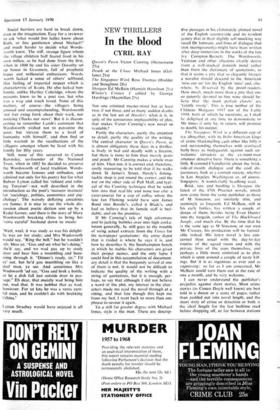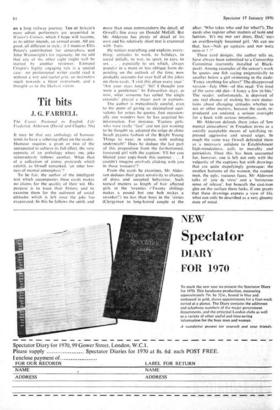NEW THRILLERS
In the blood
CYRIL RAY
Queen's Pawn Victor Canning (Heinemann 25s) Death at the Chase Michael Innes (Gol- lancz 21s) The Singapore Wink Ross Thomas (Hodder and Stoughton 28s) Shotgun Ed McBain (Hamish Hamilton 21s) Winter's Crimes I edited by George Hardinge (Macmillan 25s)
Not one criminal master-mind but at least two, if not three, and as many sudden deaths as in the last act of Ham/et: what is it, in spite of the uproarious implausibility of plot, that makes Victor Canning's new novel so readable?
Partly the characters, partly the attention to detail, partly the quality of the writing. The central character in Queen's- Pawn, as is almost obligatory these days in a thriller, is lively in bed and deadly with a firearm, but there is more to him than merely penis and pistol: Mr Canning makes a whole man of him. Then too, it is correct and, therefore, cosily reassuring to be told that if he walks down St James's Street, Hardy's fishing- tackle shop is just round the corner, and the RAC on the other side of Pall Mall, and typi- cal of the Canning technique that he sends him into that real-life and none too chic a caravanserai for a cup of coffee where the late Ian Fleming would have sent James Bond into Boodle's, called it Blade's, and had us believe that its female staff is bed- dable, and on the premises.
If Mr Canning's tale of high adventure and hi-jacking bubbles over into high cocka- lorum generally, he still goes to the trouble of using actual extracts from the Times for his newspaper quotations: the army depot that is raided is where he says it is, and how he describes it; the Southampton hotels at which he stables his characters are given their proper names, and the only lapse I could find in this accumulation of document- ary detail is that the burgundy served at one of them is not. It would not be difficult to indicate the quality of the writing with a string of quotations, but it is enough, per- haps, to say that although I did not believe a word of the plot, my interest in the char- acters made me read the novel through at a sitting, and that late though this kept me from my bed, I went back to more than one phrase to savour it again.
To a still far greater degree with Michael Innes, style is the man. There are descrip-
tive passages in his elaborately plotted novel of the English countryside and its resident gentry that in their slightly self-mocking way recall Dr Johnson. and lines of dialogue that (not incongruously) might have been written
after deep immersion in the works of the late Ivy Compton- Burnett. The Wordsworth. Yeatsian and other allusions clearly derive from a well-stocked donnish mind rather than from the dictionary of quotations, so that it seems a pity that so elegantly literary a novelist should descend to the American 'miss MP on' for the English 'miss' and, else- where, he ill-served by the proof-readers. How much, much more than a pity that one so patently devoted to fine wine should be- lieve that 'the most perfect clarets' are `faintly musty'. This is true neither of the Château Margaux 1947 nor of the Lafite 1949, both of which he mentions, as 1 shall be delighted at any time to demonstrate to Mr Innes if only he, in return, will promise to double his output.
The Singapore Wink is a different cup of tea altogether, with its Italo-American kings of crime blackmailing each other like hilly-o and surrounding themselves with scarfaced bully-boys as bodyguards against such un- welcome intruders as the ex-stunt-man amateur detective hero. There is something a little Raymond-Chandlerish about the brisk. side-of-mouth dialogue and the cool dis- passionate look at a corrupt society, whether in Los Angeles, Washington or, of course. Singapore. A wonderfully headlong read.
Brisk, too, and bustling is Shotgun, the latest of the 87th Precinct novels, which now come from the same publisher as those of M Simenon, are similarly slim, and seemingly as frequent. Ed McBain, still in his early forties, has written a couple of dozen of them, besides being Evan Hunter into the bargain, author of The Blackboard Jungle, and much else. By the time that he is the same age as M Simenon, or our own Mr Creasey, his production will be formid- able indeed. His latest novel is less con- cerned than usual with the day-to-day routine of the squad room and with the private livei of the cops themselves, and perhaps a little more contrived as to plot, which is spun around a couple of nasty kill- ings. But it is as ingenious as ever and as engrossing: so far as I am concerned, Mr McBain could turn them out at the rate of one a month, and be very welcome.
I can never understand the publisher's prejudice against short stories. Most crime stories (as Conan Doyle well knew) are best told in a dozen or a score of pages, rather than padded out into novel length, and the short story of crime or detection or both is the ideal length for the last bedtime read before dropping off, or for between stations on a long railway journey. Ten of Britain's most adroit performers are assembled in Winter's Crimes, which I hope will become, as its editor intends, an annual event. All are good, all different in style: if I mention Ellis Peters's contribution for atmosphere and John Wainwright's for ingenuity, let me add that any of the other eight " might well be starred by another reviewer. Edmund Crispin's highly engaging tale is a special case: no professional writer could read it without a wry and rueful grin, an instinctive reach towards a blunt instrument, and a thought as to the likeliest victim.



































 Previous page
Previous page